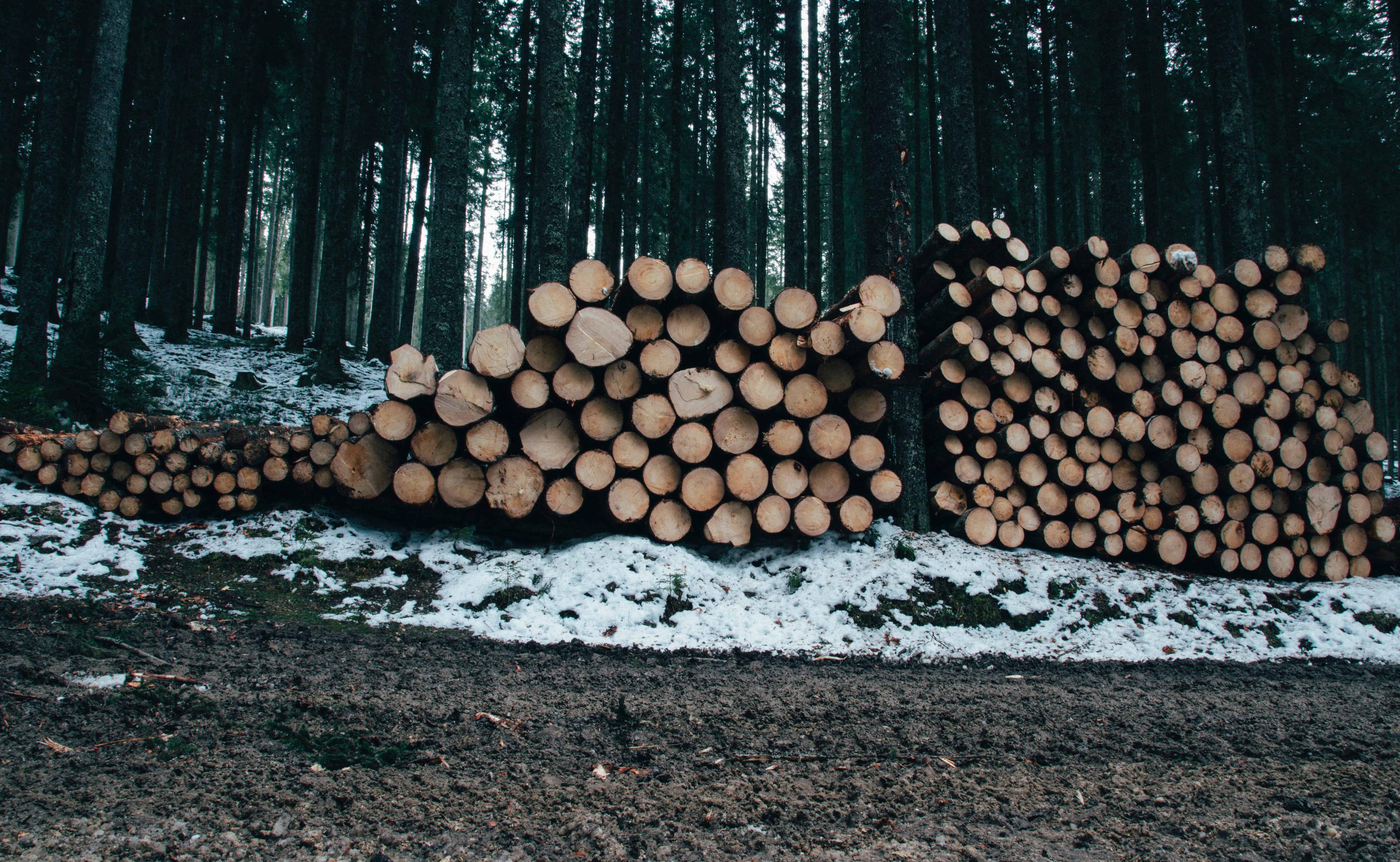Environment is one of the major topics in IELTS Writing Task 2. Your job is to write at least 250 words about different aspects of this topic. Therefore, it is absolutely necessary to widen your knowledge about the environment as soon as possible. The article below discusses the effects of deforestation which is now a serious modern issue.
Effects of Deforestation
The United States Environmental Protection Agency defines deforestation as the “permanent removal of standing forests.” The removal, however, occurs for a variety of different reasons and has a variety of devastating consequences.
What Is Deforestation?
Deforestation is the clearing, destroying, or otherwise removal of trees through deliberate, natural or accidental means. It can occur in any area densely populated by trees and other plant life, but the majority of it is currently happening in the Amazon rainforest.
The loss of trees and other vegetation can cause climate change, desertification, soil erosion, fewer crops, flooding, increased greenhouse gases in the atmosphere, and a host of problems for indigenous people.
Deforestation occurs for a number of reasons, including: farming, mostly cattle due to its quick turn around; and logging, for materials and development. It has been happening for thousands of years, arguably since man began converting from hunter/gatherer to agriculturally based societies, and required larger, unobstructed tracks of land to accommodate cattle, crops, and housing. It was only after the onset of the modern era that it became an epidemic.

Environmental Effects of Deforestation From Above
Loss of Habitat
One of the most dangerous and unsettling effects of deforestation is the loss of animal and plant species due to their loss of habitat; not only do we lose those known to us, but also those unknown, potentially an even greater loss.
“Seventy percent of Earth’s land animals and plants live in forests, and many cannot survive the deforestation that destroys their homes.”
The trees of the rainforest that provide shelter for some species also provide the canopy that regulates the temperature, a necessity for many others. Its removal through deforestation would allow a more drastic temperature variation from day to night, much like a desert, which could prove fatal for current inhabitants.
Increased Greenhouse Gases
In addition to the loss of habitat, the lack of trees also allows a greater amount of greenhouse gases to be released into the atmosphere. Presently, the tropical rainforests of South America are responsible for 20% of Earth’s oxygen and they are disappearing at a rate of 4 hectares a decade. If these rates are not stopped and reversed, the consequences will become even more severe.
Water in the Atmosphere
The trees also help control the level of water in the atmosphere by helping to regulate the water cycle. With fewer trees left, due to deforestation, there is less water in the air to be returned to the soil. In turn, this causes dryer soil and the inability to grow crops, an ironic twist when considered against the fact that 80% of deforestation comes from small-scale agriculture and cattle ranching.
Environmental Effects of Deforestation From Below
Soil Erosion and Flooding
Further effects of deforestation include soil erosion and coastal flooding. In addition to their previously mentioned roles, trees also function to retain water and topsoil, which provides the rich nutrients to sustain additional forest life.
Without them, the soil erodes and washes away, causing farmers to move on and perpetuate the cycle. The barren land which is left behind in the wake of these unsustainable agricultural practices is then more susceptible to flooding, specifically in coastal regions.
“Coastal vegetation lessens the impact of waves and winds associated with a storm surge. Without this vegetation, coastal villages are susceptible to damaging floods.”
Effects of Deforestation on Indigenous People
Destruction of Homelands
As large amounts of forests are cleared away, allowing exposed earth to whither and die and the habitats of innumerable species to be destroyed, the indigenous tribes who depend on them to sustain their way of life are also irreparably damaged.
The loss of forests has an immediate and direct effect on their lifestyle that we in the modern world, despite our own dependency on what the rainforest provides, will never know. The level of immediacy is exponentially greater.
The governments of nations with rainforests in their borders also attempt to evict indigenous tribes, and often succeed, before the actual clear-cutting begins. One of the pre-emptive effects of deforestation.
(Source: pachamama.org)
Vocabulary
| No. | Word | Word class | Transcription | English meaning | Example |
| 1 | deforestation | n | BrE /ˌdiːˌfɒrɪˈsteɪʃn/
; NAmE /ˌdiːˌfɔːrɪˈsteɪʃn/ /ˌdiːˌfɑːrɪˈsteɪʃn/ |
the act of cutting down or burning the trees in an area | land erosion caused by widespread deforestation |
| 2 | deliberate | adj | BrE /dɪˈlɪbərət/
; NAmE /dɪˈlɪbərət/ |
done on purpose rather than by accident | The speech was a deliberate attempt to embarrass the government. |
| 3 | rainforest | n | BrE /ˈreɪnfɒrɪst/
; NAmE /ˈreɪnfɔːrɪst/ , /ˈreɪnfɑːrɪst/ |
a thick forest in tropical parts of the world that have a lot of rain | The Amazon river basin contains the world’s largest tropical rainforest. |
| 4 | vegetation | n | BrE /ˌvedʒəˈteɪʃn/ ; NAmE /ˌvedʒəˈteɪʃn/ | plants in general, especially the plants that are found in a particular area or environment | The hills are covered in lush green vegetation. |
| 5 | climate change | n | BrE /ˈklaɪmət tʃeɪndʒ/
; NAmE /ˈklaɪmət tʃeɪndʒ/ |
changes in the earth’s weather, including changes in temperature, wind patterns and rainfall | The President called for urgent action on climate change. |
| 6 | desertification | n | BrE /dɪˌzɜːtɪfɪˈkeɪʃn/
; NAmE /dɪˌzɜːrtɪfɪˈkeɪʃn/ |
the process of becoming or making something a desert | At a global level desertification is increasing, leading to poverty, forced migration and conflict. |
| 7 | soil erosion | n | BrE /sɔɪl ɪˈrəʊʒn/
; NAmE /sɔɪl ɪˈroʊʒn/ |
Soil erosion is the displacement of the upper layer of soil, one form of soil degradation | Soil erosion may be a slow process that continues relatively unnoticed, or it may occur at an alarming rate causing a serious loss of topsoil. |
| 8 | flooding | n | BrE /ˈflʌdɪŋ/
; NAmE /ˈflʌdɪŋ/ |
large amounts of water covering an area that is usually dry; the fact of this happening | There will be heavy rain with flooding in some areas. |
| 9 | greenhouse gases | n | UK /ˌɡriːn.haʊs ˈɡæs/
US /ˌɡriːn.haʊs ˈɡæs/ |
a gas that causes the greenhouse effect, especially carbon dioxide | Under projected trends in greenhouse gas production, this scenario roughly approximates conditions for year 2050. |
| 10 | indigenous | adj | BrE /ɪnˈdɪdʒənəs/
; NAmE /ɪnˈdɪdʒənəs/ |
belonging to a particular place rather than coming to it from somewhere else | So who are the indigenous people of this land? |
| 11 | cattle | n | BrE /ˈkætl/ ; NAmE /ˈkætl/ | cows and bulls that are kept as farm animals for their milk or meat | These cattle are being fattened up for slaughter.
|
| 12 | logging | n | BrE /ˈlɒɡɪŋ/;
NAmE /ˈlɔːɡɪŋ/ , /ˈlɑːɡɪŋ/ |
the work of cutting down trees for their wood | The rule changes will allow logging of the last old-growth trees in many of the northwest forests. |
| 13 | onset | n | BrE /ˈɒnset/ ; NAmE /ˈɑːnset/ , /ˈɔːnset/
|
the beginning of something, especially something unpleasant | The new treatment can delay the onset of the disease by several years. |
| 14 | epidemic | adj | BrE /ˌepɪˈdemɪk/ ; NAmE /ˌepɪˈdemɪk/ | (of something bad) occurring more and more frequently in a particular place | As yet, influenza cannot be controlled by vaccines and epidemics of influenza occur every winter. |
| 15 | unsettling | adj | BrE /ʌnˈsetlɪŋ/ ; NAmE /ʌnˈsetlɪŋ/ | making you feel upset, nervous or worried | One of the documentary’s many unsettling images is of a child playing with her father’s gun. |
| 16 | shelter | n | BrE /ˈʃeltə(r)/ ; NAmE /ˈʃeltər/ | (a building designed to give) protection from bad weather, danger, or attack | They opened a shelter to provide temporary housing for the city’s homeless. |
| 17 | canopy | n | UK /ˈkæn.ə.pi/ US /ˈkæn.ə.pi/ | the branches and leaves that spread out at the top of a group of trees forming a type of roof | Many animals live in the forest canopy. |
| 18 | temperature variation | n | BrE /ˈtemprətʃə(r) ˌveəriˈeɪʃn/; NAmE /ˈtemprətʃər ˌveriˈeɪʃn/ | in meteorology, diurnal temperature variation is the variation between a high temperature and a low temperature that occurs during the same day. | Diurnal temperature variation is of particular importance in viticulture. |
| 19 | fatal | adj | BrE /ˈfeɪtl/ ; NAmE /ˈfeɪtl/ | causing or ending in death/ causing disaster or failure | If she gets ill again it could prove fatal./ There was a fatal flaw in the plan. |
| 20 | inhabitant | n | BrE /ɪnˈhæbɪtənt/ ; NAmE /ɪnˈhæbɪtənt/ | a person or an animal that lives in a particular place
|
77% of the inhabitants lived in the countryside. |
| 21 | tropical rainforest | n | BrE /ˈtrɒpɪkl ˈreɪnfɒrɪst / ; NAmE /ˈtrɑːpɪkl ˈreɪnfɔːrɪst/ | thick forest that grows in hot parts of the world | Some species live in tropical rainforests, whereas others live in dry savannas. |
| 22 | hectare | n | BrE /ˈhekteə(r)/ , also /ˈhektɑː(r)/ ; NAmE /ˈhekter/ | a unit for measuring an area of land; 10 000 square metres or about 2.5 acres | In just a few years, there were almost 200 urban gardens covering 35,000 hectares in the capital, Havana, alone. |
| 23 | the water cycle | n | BrE /ˈwɔːtə saɪkl/ ;
NAmE /ˈwɔːtər saɪkl/ , /ˈwɑːtər saɪkl/ |
the way that water is taken up from the sea, rivers, soil, etc. and then comes back down as rain or snow | Rainfall is a key link in the global water cycle and a measure for changing climate. |
| 24 | cattle ranch | n | BrE /ˈkætl rɑːntʃ/ ; NAmE /ˈkætl ræntʃ/ | farm consisting of a large tract of land along with facilities needed to raise livestock (especially cattle) | Cattle ranching is now the biggest cause of deforestation in the Amazon, and nearly 80 per cent of deforested areas in Brazil are now used for pasture. |
| 25 | topsoil | n | BrE /ˈtɒpsɔɪl/ ; NAmE /ˈtɑːpsɔɪl/ | the layer of soil nearest the surface of the ground | Much of the topsoil washed away, resulting in disastrous erosion. |
| 26 | erode | v | BrE /ɪˈrəʊd/ ; NAmE /ɪˈroʊd/ | to gradually destroy the surface of something through the action of wind, rain, etc.; to be gradually destroyed in this way | The cliff face has been steadily eroded by the sea. |
| 27 | wash (sb/sth) away | phrasal verb with wash | BrE /wɒʃ əˈweɪ/ ;
NAmE /wɑːʃ əˈweɪ/ , /wɔːʃ əˈweɪ/ |
(of water) to remove or carry somebody/something away to another place | Part of the path had been washed away by the sea. |
| 28 | perpetuate | v | BrE /pəˈpetʃueɪt/ ; NAmE /pərˈpetʃueɪt/ | perpetuate something (formal) to make something such as a bad situation, a belief, etc. continue for a long time | This system perpetuated itself for several centuries. |
| 29 | barren land | n | BrE /ˈbærən lænd/ ;
NAmE /ˈbærən lænd/ |
Those ecosystems in which less than one third of the area has vegetation or other cover. In general, Barren Land has thin soil, sand, or rocks. Barren lands include deserts, dry salt flats, beaches, sand dunes, exposed rock, strip mines, quarries, and gravel pits. | 41 million hectares (13%) of the total reporting area in India is classified as barren land. |
| 30 | susceptible | adj | BrE /səˈseptəbl/ ; NAmE /səˈseptəbl/ | susceptible (to somebody/something) very likely to be influenced, harmed or affected by somebody/something | These plants are particularly susceptible to frost. |
| 31 | coastal vegetation | n | BrE /ˈkəʊstl ˌvedʒəˈteɪʃn/ ; NAmE /ˈkoʊstl ˌvedʒəˈteɪʃn/
|
Vegetation composed of plant species, which have adapted to conditions of flooding, wind, salinity, as well as other factors specific to coastal areas. | Typical coastal vegetation is found in the various marine and coastal ecological systems of the Dominican Republic |
| 32 | whither | adv,
conjunction |
BrE /ˈwɪðə(r)/ ; NAmE /ˈwɪðər/ | where; to which/ used to ask what is likely to happen to something in the future | They did not know whither they should go. |
| 33 | innumerable | adj | BrE /ɪˈnjuːmərəbl/ ; NAmE /ɪˈnuːmərəbl/ | too many to be counted; very many
|
Innumerable books have been written on the subject. |
| 34 | irreparably | adv | BrE /ɪˈrepərəbli/ ; NAmE /ɪˈrepərəbli/ | in a way that is too bad or too serious to repair or put right | Unless the oil spill is contained, irreparable damage will be done to the coastline. |
| 35 | evict | v | BrE /ɪˈvɪkt/ ; NAmE /ɪˈvɪkt/ | to force someone to leave somewhere | A number of tenants have been evicted for not paying the rent. |
| 36 | clear-cut | n | BrE /ˌklɪə ˈkʌt/ ; NAmE /ˌklɪr ˈkʌt/ | an area of forest in which all the trees have been cut down | But the logging has been concentrated in the high-volume old-growth forest, and clear-cuts are spread over almost every one of the region’s watersheds. —Catherine Caufield |
| 37 | pre-emptive | adj | BrE /ˌpriː ˈemptɪv/ ; NAmE /ˌpriː ˈemptɪv/ | If something is pre-emptive, it is done before other people can act, especially to prevent them from doing something else | a pre-emptive attack/strike on the military base |
Nguồn từ vựng tham khảo:
- Oxfordlearnersdictionaries
- Dictionary.cambridge
- Wikipedia
- Vocabulary
- Greenpeace
- Nasa
- Agriinfo
- Merriam-webster
Before actually having mentioned the effects of deforestation, the author presented the definition of it as “the clearing, destroying, or otherwise removal of trees through deliberate, natural or accidental means”. In the article, the effects of deforestation are classified into 3 categories: environmental effects of deforestation from above, environmental effects of deforestation from below, and effects of deforestation on indigenous people. These 3 key ideas are then carefully analyzed.
The ideas of the article are summarized and illustrated in the diagram below:

Diagram 1. Summary of the article “Effects of deforestation”
It is definitely crucial for you to explore various issues relating to the environment, because it will help you not only to prepare for the IELTS Writing Task 2, but also to understand better about the world you are living in. Deforestation is a hot topic with innumerable burning questions that need to be answered. Some of its serious consequences have been mentioned in the article above. Hopefully, they will be useful for your preparation for IELTS Writing Task 2.
Practice
Now, it’s time for you to practice. You should spend 40 minutes to complete the task below.
Forests produce fresh oxygen and provide the canopy that regulates the temperature. However, the tree cover of our planet is lessening at a very high rate due to deforestation.
What are the primary causes and effects of deforestation?
Write at least 250 words.




















